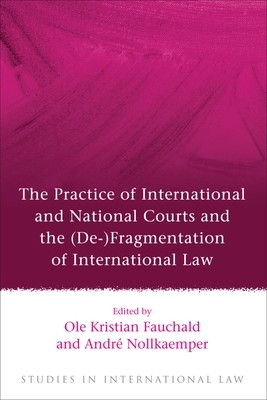
- We will send in 10–14 business days.
- Publisher: Hart Publishing
- Year: 2014
- Pages: 382
- ISBN-10: 1849466637
- ISBN-13: 9781849466639
- Format: 15.5 x 23.1 x 2.3 cm, softcover
- Language: English
- SAVE -10% with code: EXTRA
The Practice of International and National Courts and the (De-)Fragmentation of International Law (e-book) (used book) | bookbook.eu
Reviews
Description
In recent decades there has been a considerable growth in the activities of international tribunals and the establishment of new tribunals. Furthermore, supervisory bodies established to control compliance with treaty obligations have adopted decisions in an increasing number of cases. National courts further add to the practice of adjudication of claims based on international law. While this increasing practice of courts and supervisory bodies strengthens the adjudicatory process in international law, it also poses challenges to the unity of international law. Most of these courts operate within their own special regime (functional, regional, or national) and will primarily interpret and apply international law within the framework of that particular regime. The role of domestic courts poses special challenges, as the powers of such courts to give effect to international law, as well as their actual practice in applying such law, largely will be determined by national law. At the same time, both international and national courts have recognised that they do not operate in isolation from the larger international legal system, and have found various ways to counteract the process of fragmentation that may result from their jurisdictional limitations. This book explores how international and national courts can, and do, mitigate fragmentation of international law. It contains case studies from international regimes (including the WTO, the IMF, investment arbitration and the ECtHR) and from various national jurisdictions (including Japan, Norway, Switzerland and the UK), providing a basis for conclusions to be drawn in the final chapter.
EXTRA 10 % discount with code: EXTRA
The promotion ends in 17d.06:47:49
The discount code is valid when purchasing from 10 €. Discounts do not stack.
- Publisher: Hart Publishing
- Year: 2014
- Pages: 382
- ISBN-10: 1849466637
- ISBN-13: 9781849466639
- Format: 15.5 x 23.1 x 2.3 cm, softcover
- Language: English English
In recent decades there has been a considerable growth in the activities of international tribunals and the establishment of new tribunals. Furthermore, supervisory bodies established to control compliance with treaty obligations have adopted decisions in an increasing number of cases. National courts further add to the practice of adjudication of claims based on international law. While this increasing practice of courts and supervisory bodies strengthens the adjudicatory process in international law, it also poses challenges to the unity of international law. Most of these courts operate within their own special regime (functional, regional, or national) and will primarily interpret and apply international law within the framework of that particular regime. The role of domestic courts poses special challenges, as the powers of such courts to give effect to international law, as well as their actual practice in applying such law, largely will be determined by national law. At the same time, both international and national courts have recognised that they do not operate in isolation from the larger international legal system, and have found various ways to counteract the process of fragmentation that may result from their jurisdictional limitations. This book explores how international and national courts can, and do, mitigate fragmentation of international law. It contains case studies from international regimes (including the WTO, the IMF, investment arbitration and the ECtHR) and from various national jurisdictions (including Japan, Norway, Switzerland and the UK), providing a basis for conclusions to be drawn in the final chapter.


Reviews